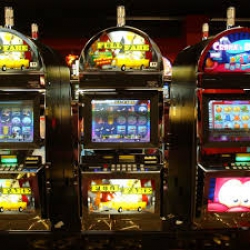
Video Lottery Terminals Play Much Like Slot Machines
The state senate of New York is backing a proposal to allow video lottery terminals in airports around the state, according to the AP. The video kiosks would be placed in the departure terminals at select airports around New York State.
Under specifically written stipulations, these terminals would be placed only in international airports inside cities with a population of 1,000,000 or more people.
That rule means Albany International Airport, Syracuse Hancock International Airport, and Buffalo Niagara International Airport would not have have the video lotto terminals. La Guardia Airport and John F. Kennedy International Airport would have the new gaming machines.
Video Lottery Terminals in New York
VLTs were introduced into New York in 2004, when operations began at the Saratoga Gaming & Raceway in Saratoga Springs. Since 2004, VLT machines have been placed in 8 other gaming venues statewide. According to the State Gaming Commission, the state had 17,213 such machines operating inside the state as of January 2013.
Are VLTs the Same as Slot Machines?
Video lottery terminals are similar in appearance to slow machines. Jackpots are tied to a central system, which tracks game play and earnings on each machine. Some provide online scratch-off lottery tickets. The results of these games are controlled from a central office and not a random number generator or RNG. Because this makes the game play out like a lottery, raffle, or game of bingo would, VLT machines are consider lottery games and therefore skirt laws against Class III slot machines.
Local laws require the jackpots to be linked to a central office, but the game otherwise plays like a slot machine. Often, local players simply refer to them as slots, though a subtle distinction exists. The naming confusion is widespread and diverse. In certain states, you’ll hear VLTs referred to as Video Gaming Devices (VGD) or Video Slot Machines. In the UK, they are known as fruit machines, while they are known as poker machines or pokies in Australia and New Zealand.
Are VLTs Tighter than Slots?
Gaming machines like VLTs have a reputation for being tight–that is, having a high house edge. Nothing about the process of arriving at results assures that a VLT is going to be a worse gambling proposition than a traditional slot machine.
Though the process of randomization is different than on Las Vegas slots, as long as the outcome is sufficiently random, this is no problem. The house edge can be set accordingly, so a house edge of 5% on the VLT would be no better or worse than a house edge of 5% on a slot machine, even though the results would be reached in different ways.
What makes the VLT a worse betting proposition is the placement of the machines. These tend to be placed in airport terminals which have a captive audience and little competition. Slot machines played on the Las Vegas Strip have dozens of competitors, so the casino operators tend to set the house edge low enough to draw players. If you play the slot at the Las Vegas airport, you’ll find the gaming machines are quite tight there, as well.
Electronic Table Games
Electronic Table Games or ETGs are also available for play. These games simulate the live versions of roulette, baccarat, and craps. Unlike the VLTs, the ETGs generate results at each terminal with the use of a random number generator.
Effect on New York’s Budget
The proposed new policy is going to have little effect outside of New York City. The gaming terminals there should attract many foreign visitors every year, effectively serving as an additional tax on foreign business people visiting Manhattan. The limitation on where the video lottery terminals will be placed is meant to keep VLTs out of airports that would provide regional air service to domestic travelers. Therefore, this can be a seen as an additional revenue source for the city and state which does not fall on taxpayers.
New York is one if 10 states considering making online casinos legal in 2014 or 2015. If so, the large population of the state would make the iPoker and online casino gambling websites among the most profitable in the nation. This would require the state to collect taxes on gaming revenues drawn mainly from the population of the state, though, so the VLT law is much less controversial among New Yorkers.
